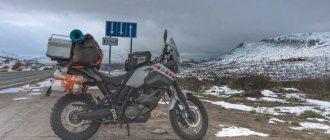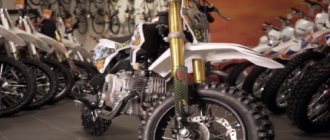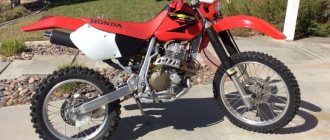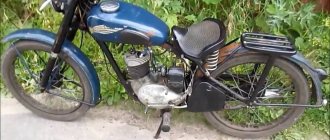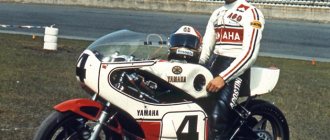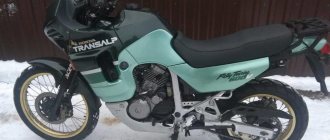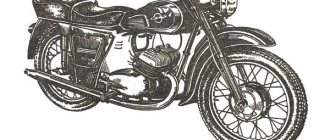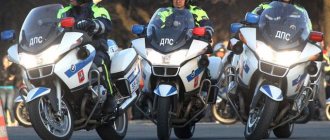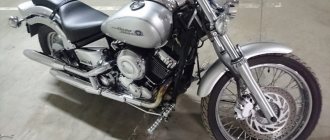The careers of most famous Russian motorcycle racers, regardless of the discipline they choose, are extremely similar: a relatively late start, hard work for results and a subsequent series of victories in one or, at most, a couple of related sports. The path to fame of David Leonov is quite different from this picture: in his still relatively short history there are ups and fatal downs, both figuratively and literally, and unexpected turns.
In my brother's footsteps
David Leonov was born on April 25, 1996 in the city of Donetsk, Rostov region. In his case, as with many other athletes, the rule works perfectly when the younger ones follow in the footsteps of the older ones - the children and younger brothers of successful riders often get on a motorcycle quite early. So it was this time: at the suggestion of his father and, taking his older brother Vladimir as an example, David also decided to connect his life with motorcycle racing, but did not blindly follow the beaten path.
He chose a different sports direction. While his older brother was firmly established in SHKMG, he himself always had a passion for off-roading, so he started with motocross and eventually settled on enduro. By the way, such a start for a Russian racer can be considered a classic one, since motocross, due to its accessibility, has become the first motorcycle discipline for the majority of domestic athletes. However, in the case of David, his father played no less a role - it was he who decided to take his five-year-old son to cross-country training races.
One way or another, the choice turned out to be correct - this was confirmed by the first successes made first in training in the fight against the motorcycle itself, and then against rivals in small local children's competitions.
In 2006, the Leonov family moved to Moscow, which undoubtedly opened up new horizons for the young athlete, but not immediately.
Vladimir Leonov: Falls are normal
About racing career
Since childhood I have been involved in motocross, and at the age of 20 I was invited to participate in road racing.
I skated in European and German championships for two years, but didn’t even compete in Russia. He was faster than our racers. At the age of 22 I went to MotoGP for the first time. And there I had to relearn: the first year I rode a 250 cc motorcycle, and the next year they changed to 600 cc, then to a liter. It's hard. In 2012, I rode in the Superbike World Championship in the world supersport class in a new team (new engineers and mechanics appeared) on a complex Yamaha with a lot of electronics. The season turned out to be good. I remember all the podiums, but especially the very first one at the World Championships in Holland. It was raining heavily and it was very cold. We struggled the whole race, but it seemed endless, the lap time dropped by 15 seconds. Over 22 laps, the time increased by about five minutes. It was really cold. We drove, fought, overtook, many fell.
In 2013 I rode again in the “supersport” class. My partner was Sam Lowes . He became the world champion. At the beginning of the season, we were unable to immediately sort out the technical problems. Because of this, I missed several races and couldn’t go fast. When they were decided, I immediately came to the podium in Italy. The season turned out to be good, everyone on the team fought for the top 5.
In 2014, he continued to ride in supersport, but on an MV Agusta motorcycle. It is small, difficult to manage, and they couldn’t solve the problems with it. And my partner, Jules Clusel , rode well and competed in the championship for the top three (in the end he took second place - editor's note). Because of this, my Russian sponsor, the Yakhnich Supersport team, in which I am still a member, but now on some media basis, test versions, abandoned this motorcycle. The team split up and the race was over for me. I no longer compete in world competitions.
Vladimir Leonov. Photo by Vladimir Yurchenko
About the spokes in the wheels
In 2011, I almost won the Italian championship, but I was let down by a mistake for which I was disqualified for one race. The mechanic forgot to put a sticker on the wheel: there [it was necessary to o or “dry”. He put the “rain” label on it, and I went with the dry one. Lost 25 points.
The entire championship was against me. That year, 2011, was the 100th anniversary of the Italian motorcycle federation. They couldn't let the Russian win.
By that point I had won four or five races in a row. Set track records for this category (Stock 600, motorcycles with a 600 cc engine - editor's note). In Misano and Vallelunga no one has beaten them yet.
In the last race I won the qualification. It was late September - early October, cold. And by lunchtime the asphalt had not warmed up. In such weather, our tires worked for 8-10 laps, then there was a decline in grip with the asphalt. And what did the [Italian motorsports] federation do? I gave the first ten of my people tires from world supersport. It's almost the same, but it runs for 15-18 laps because the races are longer.
From the start, I was first for five laps. In fact, he left everyone. Then the rubber began to tear, and they began to catch up with me. We overtook five people on a straight line. I went to the pits, then regained the advantage - and so on throughout the race.
It was the last lap, there were four turns left. And then my teammate Dino Lombardi , who eventually won the championship, simply crashed into me. Luckily (and unfortunately for them), I didn't fall. I hit the gravel at 170-180 km/h, taxied away from the wall, came back and finished fourth. And the guy who rammed me broke his collarbone and something else.
In the end, I ended up third in the championship because Ricardo Russo came second. I was 3 points short of the title. But it was a very interesting season. I learned a lot, learned a lot, took a step up in terms of speed.
About endurance racing
In 2015 I rode for the French team R2CL in the World Endurance race. The first race is 24 hours, the second is 12, the third is 24. A 25 liter tank lasts about 52 minutes. The driver changes every 50 minutes; there are three of them in the team. We changed the tires, refueled, and off we went.
Difficult races. It's difficult to adapt to them. I'm used to sprint races where you have to go as hard as you can every lap. Here the pace is lower, the ride is long, you need to have time to recover. By the sixth shift you are really tired, your hands are worn down to calluses. But we need to go. And you keep this pace, you fight. There are 10-15 overtakes per lap, very interesting.
But the team wasn’t professional enough, so after a few races I said I wouldn’t go. I understood that we were going well, but the motorcycle didn’t allow for more. It’s better not to go, not to spoil the image of the racer. We parted on friendly terms.
Participants of the master class. Photo by Vladimir Yurchenko
About the suitable motorcycle
In 2016, I won the Moscow Region Governor's Cup and tested a MotoGP motorcycle – the Ducati Desmosedici GP15. I liked it very much. Quite a complex motorcycle. You need to know a lot and be prepared for a lot. Complex carbon brakes that need to be constantly warmed up, you often use both the rear and front brake. The tires do not allow for quiet driving. You need to drive at least one lap for its frame to start working. Only from the second does it begin to hold, a grip appears and you can go fast.
I like this motorcycle. To ride, I used all my knowledge: 20% of it I didn’t use on the regular production bikes I rode at the World Championship. Constant tension, different movements, requires very good physical preparation.
It gets very hot, it heats up on its own, it’s like sitting on a stove. The test took place in Misano (Italy): the temperature was 40 °C, the asphalt was 65 °C and the motorcycle was 100 °C, and I was still in overalls. Really very hard. At the same time, there is no place to cool down. I didn't concentrate on this. I sat down and drove off. I drove only 35 laps, showed a good result - I was about 2.7 seconds behind the track record. It's not bad.
Everyone in the team liked it, they didn’t expect this. There is talk that it will be possible to continue driving. I hope I come back.
On the physical qualities of a motorcyclist
The main thing for a racer is coordination, agility, and speed. And in general you train endurance. The temperature is high on a motorcycle, you ride all the time in overalls, in a closed helmet - it’s difficult to breathe. And you move fast. From the outside it seems slow, but the pulse is high during the ride - 165–170 beats, increases during braking, and decreases during acceleration.
You need to be an athlete to complete a 50-minute race. Motorcyclists ride their bikes, go to the gym, do CrossFit, and do a mixture of athletic exercises. Stretching and flexibility are important so that when you fall at 200 km/h, when you are spinning, you do not get unnecessary injuries.
All MotoGP riders are prepared and trained. They need a lot of strength. With a motorcycle power of about 250 hp. s., complex electronics and a weight of 153 kg, it does not seem light at all. Although it is lighter than the 600 class: it weighs 163 kg, and if it’s a liter, then 185 kg.
Photo by Vladimir Yurchenko
About falls
For a professional racer, falling is common. This is also normal for ordinary motorcyclists. In the park, while riding a bicycle, people fall. But here you take risks, drive fast, make some mistakes.
Falls also develop. The only question is what they are. If you drive correctly, they are quite safe and occur less frequently. And when beginners who forget to press the brake or change gear fall, it is very unpleasant for them. Often such ridiculous falls lead to injuries.
70% of falls are generally harmless: from a large inclination, 55 degrees, consider that you are already lying on the ground. He fell and slipped. But it depends on the speed: if you fall from 200 km/h, it’s hard to control yourself so that you don’t get unraveled.
Learning to fall correctly is a matter of time and training. I have an understanding of what to do, I can teach you. The main thing is when you fall, don’t throw your hands away. You need to gather yourself, squeeze and slide as much as possible. When you fall on asphalt, you need to drive into the gravel not sideways, but with your feet, so that you don’t start to spin. When I fall, I look at which side I'm landing in the gravel. Then, when I touch it, I gather myself.
When you learn to drive in correctly, brake and open the gas in time, then there will be less chance that you will fall ridiculously.
About show-offs
It has always been and, I think, will remain that motorcyclists, like cyclists and skaters, will show off in front of each other. But on public roads people are at risk, and most of all the motorcyclists themselves, because the car is at least somehow protected. When they start rushing along the road and cutting off cars, this is fraught with falls, injuries, and other unpleasant things.
We must respect other road users. If you want to practice and try tricks, improve your skills, you need to do this in special areas far from the roads.
I myself haven’t driven around the city for a long time. Previously, it was because of the contract, but now there’s just not enough time. I rarely go out for a ride. I have two motorcycles: a Yamaha R-6 and a Ducati Hypermotard. For driving around the city I like the second one better. It's more interesting.
Russian fame
In general, despite the importance of motocross for the career of Leonov Jr., he failed to achieve truly impressive and high-profile results, with the possible exception of the title of Master of Sports in motocross, in this discipline. In the role of a strong, independent athlete, and not the younger brother of the famous road racer, he appeared later, in 2010, in another discipline. It was then that David’s name appeared on the first line of the final table of the “Moto” class of the Country Cross Cup, organized by the specialized website XSR-MOTO.ru. But, as they say, the most interesting was yet to come.
As a prize for winning the Cup, David, who at that time was a member of the Terekhovo-13 motorcycle club, received not only a standard medal, but also a much more valuable prize. The Red Bull company, which actively supports extreme sports disciplines and sponsored the last cup, presented the winner with a much more valuable award. She received a fully paid participation in the Red Bull Romaniacs 2011 event - a unique combination of motorcycle, country and enduro cross and motorcycle trials. By the way, David became the first Russian athlete to take part in such a race.
But that's not all. After the victory of the young (at that time he was only 14) athlete, representatives of the Yakhnich Motorsport team noticed. It is worth noting here that the main direction of her work is SHKMG and, despite David’s achievements in enduro, the management decided to continue his training in the road direction, and the team’s head coach, Claudio Corsetti, became responsible for his preparation. But, despite this, Leonov Jr. did not work out with road races - even at the very beginning of training, he admitted that he was much more interested in off-road driving, and, apparently, he fell in love with a smooth asphalt track. failed. The “peak” of this career turn was participation in the Coppa dei due paesi, the “Cup of Two Countries” - an international road competition with an Italian-Russian organization.
From the track to your favorite off-road
After the start of cooperation with Yakhnich Motorsport, a small gap appeared in David’s track record - instead of sending the athlete to competitions, the team placed a huge emphasis on training and training. In this regard, Leonov Jr. again appeared on the radar only in 2014, and in his usual role as an endurist, or rather, a participant in the Red Bull 111 Megawatt hard enduro championship, which took place in Poland and was part of the Red Bull Hard Enduro World Series. Such a long break in enduro did not pass without a trace - David took only 8th place.
He also took part in this two-day competition the next time, in 2015, but even here he did not win - the athlete had to be content with only 5th place. In the same 2015, Leonov took part in another European race, Erzbergrodeo XXI, which took place in the Austrian Alps. The track this year turned out to be so difficult that our athletes (Russia, along with David, was represented by another racer, Dmitry Parshin) did not manage to finish the main race at all. To be fair, we note that not a single athlete managed to overcome all the checkpoints, and several participants who were able to overcome the maximum distance were named winners.
Despite a number of failures, 2015 cannot be called a failure for Leonov. At the end of the summer, Red Bull, of which our compatriot is still an athlete, organized a small festival of extreme sports, Moscow City Games, where an endurocross race was also organized for the first time. The race was radically different from the usual enduro, since the track was laid on asphalt, but this did not stop David - he became the winner.
The year ended with a real surprise - the driver’s participation in the Winter Games 2015, held in Luzhniki on December 19-20. Not only did Leonov suddenly compete in the “quad bike” class, but he also won silver.
One of the country's strongest motorcycle racers, David Leonov, returns to Vladivostok for victory.
Tomorrow, September 29, the “At the Limit” motorcycle race will take place in Vladivostok. Among the participants this year is one of the strongest racers in Russia, David Leonov. In 2015, the athlete already participated in the Vladivostok race “At the Limit”. According to the pilot, problems with the navigator prevented him from winning. On the eve of the rematch race, David Leonov spoke about how he prepares for the race and what it means to him to be “on the limit.”
– David, what do you remember most from the 2015 race?
– The terrain simply shocked me with its ups and downs, and in general, I practically never rode in races of such length (in two days athletes cover about 200 km. – Editor’s note). This is a very difficult route and very interesting. It’s easier for local riders, of course; they’ve experienced their own mountains. If it weren’t for problems with the navigator, I might have won in 2015, but it was not easy for me to drive. I would like to note that the riders from Primorye have a high level of extreme enduro; they are competitive and experienced guys.
– The race consists of two parts – the prologue, which takes place on a track with artificially created obstacles, and the off-road part – on natural terrain. What do you get more pleasure from?
- There is a task, there is a race, we need to go. And it doesn’t matter here whether you like it or not. To be honest, I don’t like mountains, because I’m not very experienced in them, but I treat them calmly. I love the prologue, the so-called endurocross, this is what I really like.
– What is more important for a motorcycle racer - to know the track or to have good physical training?
– Undoubtedly, physical training plays a big role, but not as much as riding a motorcycle and riding on different routes, different terrain, soil, forests. With good physical fitness, you can, of course, carry a motorcycle on your own, but having experience riding on different routes, you can rest more during the distance and overcome difficulties more easily. But again, one is impossible without the other. I train a lot on a motorcycle, ride against the clock, practice elements, but, of course, I also train in the gym with a trainer. If I'm at home, I run. Yesterday we ran 10 kilometers with the dog.
– To come to Vladivostok, you missed the race in Turkey...
– Yes, this is an important race for me, but I’m glad that I’m going to Vladivostok, I haven’t won here yet!
– The race is called “On the limit”, remember the last time you were on the limit?
– There was a race in Austria. First, I damaged the brake disc, and I had to go up and downhill without a front brake. It was very difficult. By the end of the race I had no strength at all! I drove and told myself that I needed to get to the finish line, the finish is an obligatory part of the race.
Let us remind you that the race “At the Limit” will start at Primring tomorrow, September 29, at 16:00. The prologue is perhaps the most beautiful stage of the competition: the athletes are still full of strength, and the obstacles force them to give their best. By the way, this track was built for several weeks specifically for the “At the Limit” race. For the convenience of spectators, viewing points have been organized along the prologue route, where spectators can comfortably watch the passage of difficult but spectacular sections.
Based on the results of the prologue, the starting order of the participants in the main, off-road part of the race will be determined. On Saturday morning, the pilots will start from the Rus Hotel and finish in the evening at the Mayak recreation complex, from where they will go to the final part of the competition on Sunday. Athletes finish in the area of Lesnaya Street, on Zarya. Entry to the competition is free.
New successes and the World Championship
2016 turned out to be no less interesting. Already at the very beginning of spring, the Breakthrough 2016 festival took place at the Olimpiysky Sports Complex, which instantly received the status of the largest event in the history of extreme Russian sports, as it included a dozen different disciplines, including incredible freestyle on snowmobiles, and brought together more than 100 participants . There was also enduro, or more precisely, enduro-cross. However, here the victory eluded David - it was won in the super final by another athlete already known to you - Alexander Ivanyutin. However, the season had not even started yet, so Leonov still had a place to show himself.
So at the end of the summer he became the winner of the second stage of the endurocross.ru Cup in the moto-open class, and in December he even took part in the SuperEnduro World Championship (FIM SuperEnduro World Championship, SEWC) 2016-2017 (the World Championship is held in indoor arenas in the winter months , so it takes two years). And if the first stage in Poland, according to the driver, turned out to be much more difficult than he expected - due to poor preparation and an unfamiliar track, he was not even able to qualify, then in the second, in Germany, he entered the top ten. Moreover, the Russian athlete deliberately competed in the higher Prestige class, specifically challenging himself, despite the opportunity to start with the “junior group”. As a result - 14th position in the final standings.
SEWC was followed by another performance at Proryv 2017 with its Enduro X race. In it, Leonov turned out to be the strongest not only in qualifying, but also in both main races. However, by the standards of the sports world, “Breakthrough” is more of a show than a full-fledged race. Achievements within the framework of official championships, for example, the Czech Enduro Championships, are much more important. And, I must say, here David also lost face - he won gold in the E2 class and became the absolute champion of Russia.
There was in 2021 the Red Bull 111 Megawatt, which had already become familiar to Leonov, which again remained unconquered - 15th place in qualifying and retired from the race in the main race. Another Red Bull race, Hare Scramble 2021, also turned out to be disappointingly unsuccessful: first, a stone damaged the front brake, completely blocking the wheel, and after solving this problem and passing a couple more checkpoints, the motorcycle’s battery simply died. But on the other hand, out of 500 participants in this race, only 25 managed to reach the finish line on time (within 4 hours), so Leonov’s loss does not look so surprising.
The next important test in David's career was SEWC 2017-2018. The first stage in Poland, where the athlete began to test his new Gas Gas EC300 bike, ended prematurely. After successfully qualifying during the qualifying race, he suffered a wrist injury, due to which he was simply unable to participate in the main race. However, he was not going to give up and, having recovered from the injury, took part in the next stages, but remained disappointed - he failed to rise above 21st place in the finals.
SEWC: David Leonov gained experience of driving under stress in Hungary
If you are going to SEWC, you need to be able not only to race along a track full of obstacles, but also to repair the motorcycle yourself. Without the help of mechanics and directly on the track, if something happens during qualifying or in the finals. For example, Russian David Leonov had a chance to replace his chain during qualifying...
MOTOGONKI.RU, February 5, 2021 — Based on the results of 4 stages of the Superenduro World Championship, David takes 11th place. In Budapest, he finished 11-8-10 in three finals, starting from last place... all because of an emergency situation in qualifying.
David Leonov:
A very balanced track was built in Budapest. At the same time, difficult, and high-speed, and slightly trial, and gag - it was all included. She liked everyone and the fight in all the heats was very interesting. From the first to the last minute everyone was fighting and pushing each other.
I went through the qualifying sessions and timed practice calmly and rolled into the track. I won the qualifying heat and made it to the finals. It would seem that everything is ok, but I was not able to participate in the general qualifications...
Having missed qualifying and not showing a fast lap, David starts from the most unfavorable position
...Literally half a circle before the jump, the chain broke. Since this is no longer a free workout, according to Superenduro rules, a mechanic cannot make repairs, and repairs must only be done on the track.
I quickly rolled the motorcycle into the starting area and almost managed to put on the chain, but there were already 10 seconds left before the end of the session. Of course, it was insulting, I was upset.
I started last, 14th, from the corner. The most difficult was the first race. Gomez and Blake Guzley fell in front of me - right into my wheel - which is why I left the last from the start, but I did a good job and got out.
The second and third races went a little better. I was driving quite fast, but it turned out that after a circle I ran into something and lost a couple of positions. Especially in the second race: I was riding fourth, and somewhere a lap before the finish I collapsed on a concrete block and had to carry the motorcycle over this concrete block. Lost three positions and came in eighth.
What to say. Gained experience of driving under stress. Even despite the mistakes made in the race, in all three races I fought until the last, did not give up, rode, and got out. So overall everything is fine. At the last stage we will enter the TOP 5 and fight with all the fast ones!
The final stage of the SuperEnduro World Championship will take place in Poland on March 14 at the Atlas Arena (Lodz).
Goodbye enduro?
It’s difficult to say whether disappointment in his own result at SEWC was the reason for his next decision, but in the summer of 2021 David suddenly joined his older brother’s VL65 Racing Team. More precisely, not quite like that. Formally, he was its pilot before, but it was this season that he took to the track as part of the Russian Supermoto Championship. And, I must say, he did it quite successfully, especially considering how much different asphalt racing is from cross-country and enduro. The result was 11th place (out of 21 participants) in the “Pro” class.
Participation in the supermoto competition turned out to be spontaneous, and after it David returned to his favorite off-road. The first race after his peculiar return was the “Are There Violent Ones?” race, in the preparation of the route for which he was directly involved. Knowledge of the route and experience helped me become a winner in two competitions at once - endurocross and extreme enduro.
The local competition was followed by a now permanent participation in SEWC 2018-2019, and this season became the most successful for the Russian endurist - he took 10th place among the best athletes in the world. David’s plans for the summer season included participation in all stages of the World Enduro Super Series (WESS, world enduro super series), but at the very beginning of May one of his training sessions ended with an extremely unsuccessful fall and ruptured ligaments in his knee, which literally put an end to all his immediate plans .
However, contrary to the doctors’ orders, David still prematurely entered the track of the first stage of the Russian Extreme Enduro Championship, and then, after the end of the recovery period, the following races. Even despite the forced 3-month refusal to train on a motorcycle, Leonov managed to become the winner of the Czech Republic in the “Sport” class.
And finally, the last significant event in his career at the moment was SEWC 2019-2020, which managed to end before the pandemic raged. In the final standings in the Prestiege class he took 11th place.
As for the endurist’s further plans for the year, nothing is known about them yet, but one thing can be said for sure: as soon as the situation allows, David Leonov will definitely return to his favorite extreme tracks and will delight his fans with good results more than once. Well, we can only wish him good luck and hope for prizes in SEWC next season.
